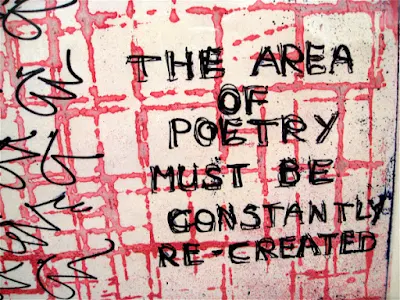Brion Gysin was a writer and painter. He is best known for his rediscovery of Tristan Tzara's cut-up technique while cutting through a newspaper upon which he was trimming some mats. He did many experiments with cut-ups while living in Tangiers, where he established with the Moroccan painter Mohamed Hamri a cafe called the 1001 Nights in order to employ members of the Master Musicians of Joujouka an ancient Sufi musical collective from the Rif Mountains. so that he could hear them as frequently as possible. He shared all this with his friend William S. Burroughs, who subsequently put the cut-up technique into good good use and dramatically changed the landscape of American literature. To be used again with dramatic effect by the late great Kathy Acker.
The trance-inducing, hypnotic qualities of tthe Master Musicians of Joujouk's music deeply resonated with Gysin’s interests in ritual, mysticism, and altered states of consciousness. He saw the musicians as keepers of a spiritual tradition that transcended time and sought to bring their work to Western audiences.
Gysin and Burroughs famously organised performances of the Master Musicians, introducing their powerful sound to visitors like Rolling Stones guitarist Brian Jones, who would later record Brian Jones Presents the Pipes of Pan at Joujouka in 1968. Gysin’s role as a cultural bridge between the West and the mysticism of Morocco was not limited to the Beats. His collaboration with Jones would help bring the Master Musicians to the attention of a wider audience, weaving Gysin’s influence into the world of 1960s rock music.
Born in Buckinghamshire, England, raised in Alberta by his Canadian mother, but sent to a secondary school at Downside Catholic College in England. His dad was Swiss who went missing in action in the First World War.By the age of 19 deft at language, Brion was a Parisian and surrealist. Beginning a life of adventure leading eveywhere.
A consumate innovator, Gysin altered the cut-up technique to produce what he called permutation poems in which a single phrase was repeated several times, with the words rearranged in a different order with each reiteration. Together with Burroughs they thought the spell of language could be broken by slicing,dicing and splicing.
An outsider who wanted to ' liberate the words from language.' though without the rules of language I guess words can take on the form of psychobabble. But Gysin liked to use methods deemed outside the pantheon of recognised mediums.
A truly radical trailblazer, Artist, poet, magician, subversive , painter, shaman - Gysin was all these things and more.
It is impossible to sum up the importance of this man, his art in a few short paragraphs, I have long admired him, and would urge you to seek him out.
Significantly he has been called the most influential cultural figure of the last century that most people have never heard of. A big influence on the late David Bowie acting a symbolic role , as an image of unrefined creativity. Bowie talked about the cut-up technique a lot using it to ignite anything that might be in his imagination. Eventually meeting Gysin in 1976., the cut up effect used on his album the Next Day in 2013. The film about David Bowie Cracked Actor: A film about David Bowie that was made in 1974 for Omnibus as part of the BBC's art strand was I guess my first introduction to the worlds of Burroughs and Gysin, so cheers David.
So Happy 100th birthday Brion Gysin who together with William Burroughs created a 'third mind ' and 'stormed the citadels of enlightenment.'
' Writing is fifty years behind painting. I propose to apply the painters' techniques to writing; things as simple and immediate as college or montage. Cut right through the pages of any book or newsprint... lengthwise, for example, and shuffle the columns of text. Put them together at hazard and read the newly constituted message. Do it for yourself. Use any system which suggests itself to you. Take your own words or the words said to be "the very own words" of anyone else living or dead. You'll soon see that words don't belong to anyone. Words have a vitality of their own and you or anybody else can make them gush into action.
The permutated poems set the words spinning off on their own; echoing out as the words of a potent phrase are permutated into an expanding ripple of meanings which they did not seem to be capable of when they were struck into that phrase.
The poets are supposed to liberate the words - not chain them in phrases. Who told poets they were supposed to think? Poets are meant to sing and to make words sing. Poets have no words "of their own." Writers don't own their words. Since when do words belong to anybody.
"Your very own words," Indeed! And who are you? '
From 1960 essay:- Cut-Ups Self-Explained.
CUT-UPS AND PERMUTATIONS
' Here is the gimmick. Cut up everything in sight. Make your whole life a poem. You can't lose man. You can't lose because you've got nothing to lose but that worthless junk you're sitting on. Get out of the blue Frigidaire and live.
Try it. Be a Poet. Be a Man.'
Gysin - Cut me up
Brion Gysin - No Poets (1962)
A consumate innovator, Gysin altered the cut-up technique to produce what he called permutation poems in which a single phrase was repeated several times, with the words rearranged in a different order with each reiteration. Together with Burroughs they thought the spell of language could be broken by slicing,dicing and splicing.
An outsider who wanted to ' liberate the words from language.' though without the rules of language I guess words can take on the form of psychobabble. But Gysin liked to use methods deemed outside the pantheon of recognised mediums.
A truly radical trailblazer, Artist, poet, magician, subversive , painter, shaman - Gysin was all these things and more.
It is impossible to sum up the importance of this man, his art in a few short paragraphs, I have long admired him, and would urge you to seek him out.
Significantly he has been called the most influential cultural figure of the last century that most people have never heard of. A big influence on the late David Bowie acting a symbolic role , as an image of unrefined creativity. Bowie talked about the cut-up technique a lot using it to ignite anything that might be in his imagination. Eventually meeting Gysin in 1976., the cut up effect used on his album the Next Day in 2013. The film about David Bowie Cracked Actor: A film about David Bowie that was made in 1974 for Omnibus as part of the BBC's art strand was I guess my first introduction to the worlds of Burroughs and Gysin, so cheers David.
So Happy 100th birthday Brion Gysin who together with William Burroughs created a 'third mind ' and 'stormed the citadels of enlightenment.'
' Writing is fifty years behind painting. I propose to apply the painters' techniques to writing; things as simple and immediate as college or montage. Cut right through the pages of any book or newsprint... lengthwise, for example, and shuffle the columns of text. Put them together at hazard and read the newly constituted message. Do it for yourself. Use any system which suggests itself to you. Take your own words or the words said to be "the very own words" of anyone else living or dead. You'll soon see that words don't belong to anyone. Words have a vitality of their own and you or anybody else can make them gush into action.
The permutated poems set the words spinning off on their own; echoing out as the words of a potent phrase are permutated into an expanding ripple of meanings which they did not seem to be capable of when they were struck into that phrase.
The poets are supposed to liberate the words - not chain them in phrases. Who told poets they were supposed to think? Poets are meant to sing and to make words sing. Poets have no words "of their own." Writers don't own their words. Since when do words belong to anybody.
"Your very own words," Indeed! And who are you? '
From 1960 essay:- Cut-Ups Self-Explained.
CUT-UPS AND PERMUTATIONS
' Here is the gimmick. Cut up everything in sight. Make your whole life a poem. You can't lose man. You can't lose because you've got nothing to lose but that worthless junk you're sitting on. Get out of the blue Frigidaire and live.
Try it. Be a Poet. Be a Man.'
Gysin - Cut me up
Brion Gysin - No Poets (1962)
Brion Gysin
(untitled 1971)
A short film that makes me stop paying attention to what I am doing and lose myself in the idea that:- 'Nothing is true and everything is permitted.'
I Am that I Am














